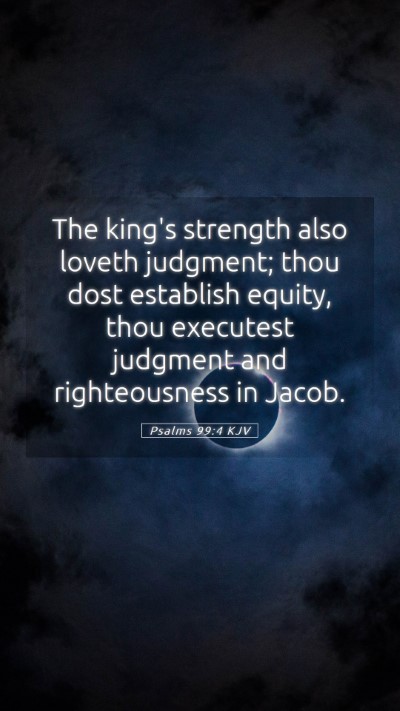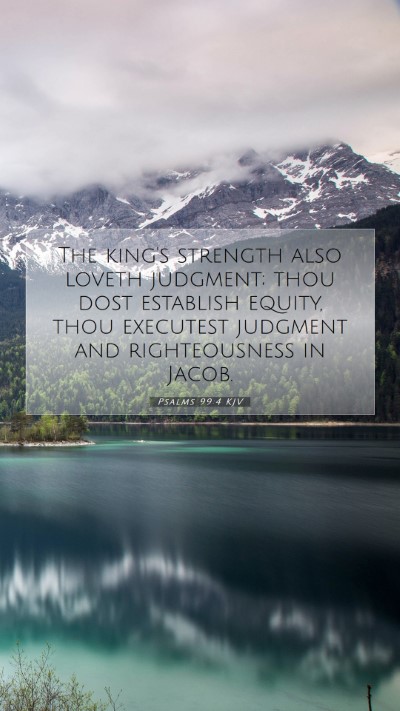Psalms 99:4 - Commentary and Interpretation
Psalms 99:4 states: "The King’s strength also loveth judgment; thou dost establish equity, thou executest judgment and righteousness in Jacob." This verse offers rich content for Bible verse understanding, exploring key themes of divine justice, righteousness, and the nature of God's rule over His people.
Verse Analysis
The verse highlights two primary attributes of God as King: His strength in governance and His love for justice. The Hebrew term for "strength" signifies not just power, but also the rectitude and authority necessary for fair rule. This concept is expanded in various commentaries, aligning closely with the overall message of the Book of Psalms regarding God’s sovereignty.
Attributes of God
- Strength: God is portrayed as a powerful King whose reign is characterized by authority and might. His strength is not for oppression but for establishing justice.
- Judgment and Righteousness: The verse emphasizes that God's rule is infused with judgment and righteousness, suggesting that He actively promotes fairness and equity among His people.
- Equity: God does not favor the rich or powerful over the poor and oppressed, proving His impartial nature.
Bible Verse Meanings
According to Matthew Henry, this verse presents a duality in God’s character—His inherent strength is coupled with a profound love for justice. God’s governance is marked by His desire to see righteousness flourish, especially in "Jacob," a reference to the house of Israel.
Albert Barnes expounds that the 'judgment' mentioned refers to both the moral laws, which God established for His people, and the actions that God takes as a righteous judge. The idea is that God's actions within history manifest His commitment to justice and equity.
In the view of Adam Clarke, the verse reinforces a communal aspect of justice, signifying that God’s justice is not just personal but extends to the entirety of the people, ensuring that everyone—especially the marginalized—receives fair treatment.
Significance in Context
This verse resides amidst a larger narrative praising God for His sovereignty and holiness, underscoring the critical theme of justice, which is central in the Psalms. It reflects the kingly authority of God and His commitment to ensuring equitable treatment as a governing principle.
Application in Daily Life
Understanding the implications of Psalms 99:4 can shape one's ethical framework and encourage individuals and communities to pursue justice and righteousness, echoing God's own character. This necessitates a practical application of this verse in Bible study groups and personal reflection on how to enact justice in today's world.
Cross References
- Psalms 89:14 - "Justice and judgment are the habitation of thy throne: mercy and truth shall go before thy face."
- Isaiah 61:8 - "For I the LORD love judgment, I hate robbery for burnt offering; and I will direct their work in truth, and I will make an everlasting covenant with them."
- Micah 6:8 - "He hath shewed thee, O man, what is good; and what doth the LORD require of thee, but to do justly, and to love mercy, and to walk humbly with thy God?"
Conclusion
Psalms 99:4 serves as a profound reminder of God's commitment to justice and righteousness. By seeking to understand this scripture through diligent study and reflection, individuals can gain deeper insights into their faith and responsibility in society. It encapsulates the essence of God's governance, offering a model for human conduct that aligns with divine expectations.
For those engaging in online Bible study or exploring Bible study resources, consider the implications of God’s justice in both historical and contemporary contexts. This verse not only provides a basis for personal conduct but also a standard for community and societal justice that resonates through the ages.


